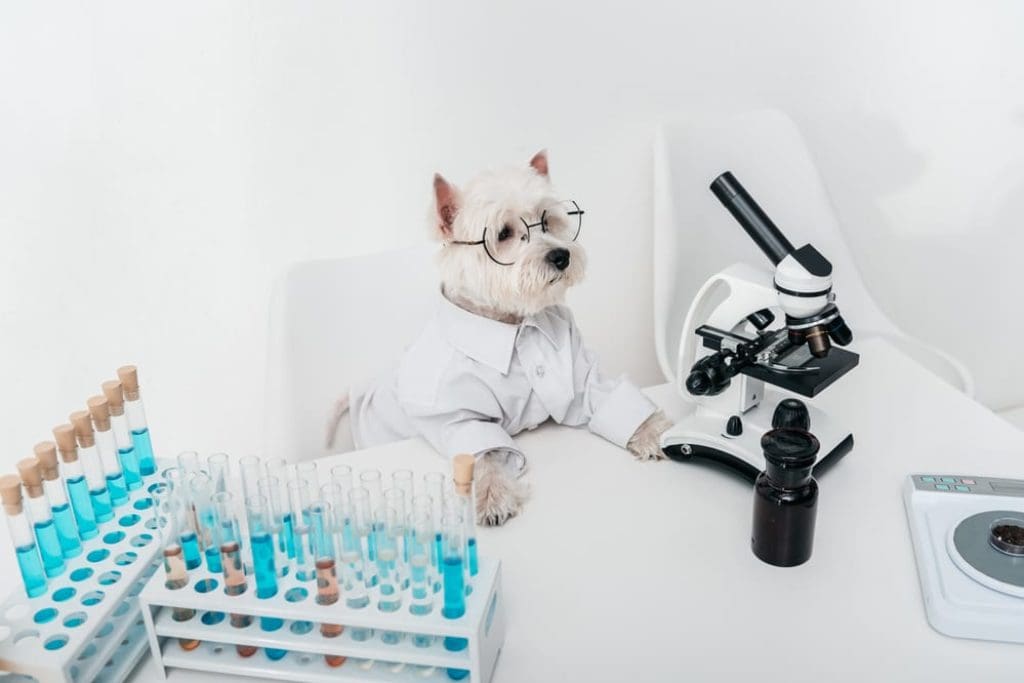Your Dog Can Get Tested For Coronavirus Faster And Easier Than You Probably Can
Two household pet cats in New York state tested positive for the virus, SARS-CoV-2, becoming America’s first confirmed COVID-19 pets. The U.S. Department of Agriculture (USDA) and Centers for Disease Control and Prevention (CDC) made the announcement on Wednesday. Not surprisingly, the COVID-19 cats have been making big headlines.
However, there is a bigger, more important story here — which is how exactly the two cats’ cases were initially detected. Both cats, it turns out, were found to have been infected through routine tests conducted by their respective veterinarians when their owners brought them in for mild respiratory symptoms. Because the veterinary practices treating the cats happen to be two of the approximately 10,000 practices that use Antech Diagnostics, the cats’ samples were tested for the virus simply by default. Only one of the two cats lives in a household with a person who has also tested positive for the virus.
“In its surveillance program, Antech is testing cat and dog samples that veterinarians submit for PCR analysis,” Antech explains on its website, adding that the test is “a routine practice when an animal presents with symptoms that suggest a common infection or illness. The PCR analysis Antech performs as part of its surveillance program is specifically for veterinary use; it does not consume resources for human COVID-19 testing. Antech will continue to monitor samples and report any discovery of positive cases to local, federal and veterinary authorities,” the statement says.
Antech Diagnostics, one of America’s largest veterinary laboratory diagnostic companies, would only say that the program began in early March, declining to specify a date. A spokeswoman told The Canine Review that approximately 2,000 cats and dogs in the United States (and some in Canada) have been tested for the virus since the program started. Specifically, about 2,000 cats and dogs have been tested for a respiratory or gastrointestinal infection at a practice that uses Antech Diagnostics since the start date of the surveillance, and therefore also would have been tested for the virus, a spokeswoman for Antech explained. Antech Diagnostics’ parent company is Mars, which also owns the VCA, Banfield, and Blue Pearl veterinary hospital and clinic chains.
In a telephone interview, Dr. Jennifer Ogeer, Antech’s vice president for medical affairs and commercial marketing, confirmed that any client of any practice that uses Antech whose dog or cat is tested for a respiratory or gastrointestinal illness (using a swab or fecal sample, respectively) is included in the surveillance program. This means that, at least for the moment, for many Americans, it is probably easier to get a pet tested for the virus than it is for themselves.
Dr. Ogeer emphasized that apart from the two cats in New York, all of the thousands of tests conducted by both Antech and Idexx, another veterinary diagnostics company, have produced all negative results. “That, I think, is so important for people to be aware of. That’s going to give people confidence in being able to interact with their pets in this time when we’re all isolated,” she added.
Asked why she thought the human realm had apparently not yet been able to do as a matter of routine what Idexx or Antech did several weeks ago, Ogeer said:
We’re a veterinary diagnostic company. We’re not FDA-approved to do human testing. The testing we do at Antech is for veterinary uses only. We’re not using or consuming resources for human testing..I think your question would be a good one to ask someone in the public health realm as to what happened on the human side. I think part of it is, on the human side, there’s a case definition that they work with to identify who gets tested or not. And it’s a very clear case definition.”
Idexx, another company that provides diagnostic laboratory testing for veterinarians, has also thrown its hat in the COVID-19 surveillance ring. “Since mid-February, IDEXX Reference Laboratories has tested over 5,000 specimens for the COVID-19 virus, from cats, dogs, and horses with respiratory symptoms in 17 countries,” the company said in a statement – meaning that between Antech and Idexx, some 7,000 animals have been tested.
“To date, Idexx has found no positive results,” the company added. “This suggests dogs and cats living with infected people generally remain uninfected, except in rare and isolated cases.”
Other animals have tested positive for the virus: A cat in Belgium, lions and tigers at the Bronx Zoo, and two dogs in Hong Kong (however, scientists are skeptical about how the study was conducted in Hong Kong). After Antech’s tests for the two cats came back with positive results, Ogeer says that Antech notified the USDA which then confirmed the tests through its National Veterinary Services Laboratories (NSVL).
“I think the surveillance testing was something that we felt, as a diagnostic company, we wanted to contribute to fact-based and scientific understanding of what was happening with this virus,” Ogeer said. “How it was spreading, what was the frequency of transmission…I think collectively, it’s been a ‘Good Citizen’ badge on our part, not just from a veterinary prospective, but from a One Health perspective.”

